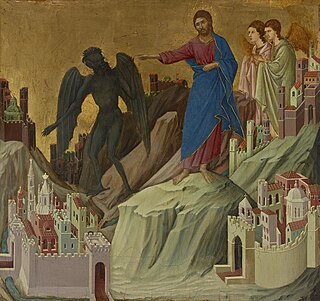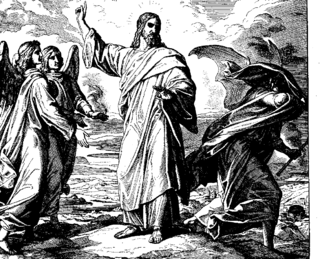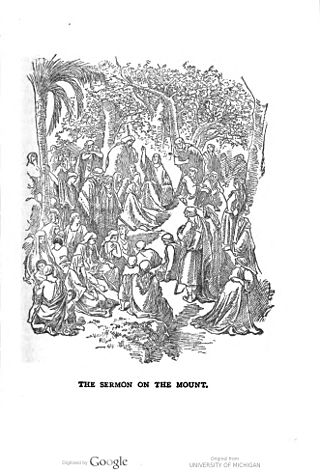
The Lord's Prayer, also known by its incipit Our Father, is a central Christian prayer that Jesus taught as the way to pray. Two versions of this prayer are recorded in the gospels: a longer form within the Sermon on the Mount in the Gospel of Matthew, and a shorter form in the Gospel of Luke when "one of his disciples said to him, 'Lord, teach us to pray, as John taught his disciples'". Regarding the presence of the two versions, some have suggested that both were original, the Matthean version spoken by Jesus early in his ministry in Galilee, and the Lucan version one year later, "very likely in Judea".

Matthew 3:2 is the second verse of the third chapter of the Gospel of Matthew in the New Testament. John the Baptist has been introduced in the first verse and this verse describes the message that he is preaching. Through John's message, Matthew introduces the "Kingdom of Heaven".

Matthew 4:8 is the eighth verse of the fourth chapter of the Gospel of Matthew in the New Testament. Jesus has just rejected Satan's second temptation. In this verse the devil transports Jesus to a new location for the third temptation.

Matthew 4:10 is the tenth verse of the fourth chapter of the Gospel of Matthew in the New Testament. Jesus has rebuffed two earlier temptations by Satan. The devil has thus transported Jesus to the top of a great mountain and offered him control of the world to Jesus if he agrees to worship him. In this verse, Jesus rejects this temptation.

Matthew 5:1 and Matthew 5:2 are the first two verses of the fifth chapter of the Gospel of Matthew in the New Testament. The verses introduce the Sermon on the Mount that will be recited in the next several chapters. The previous chapter concluded with large crowds "from Galilee, and from the Decapolis, Jerusalem, Judea, and beyond the Jordan" who followed Jesus to witness him healing: these verses present Jesus as seeing the crowds and going up onto a mountain to begin teaching.

John 3 is the third chapter of the Gospel of John in the New Testament of the Christian Bible. It deals with Jesus' conversation with Nicodemus, one of the Jewish pharisees, and John the Baptist's continued testimony regarding Jesus. Baptist preacher Charles Spurgeon said of this chapter that it is the one he would choose "to read to a dying man who did not know the gospel, [as] the most suitable one for such an occasion".

Matthew 28:19 is the nineteenth verse of the twenty-eighth chapter of the Gospel of Matthew in the New Testament. This verse is part of the Great Commission narrative, containing the command to go, teach and baptize new disciples with the trinitarian formula.

Matthew 28 is the twenty-eighth and final chapter of the Gospel of Matthew in the New Testament. This chapter records that Jesus is risen, describes the actions of the first witnesses to this event, and ends with the Great Commission.

Matthew 23 is the twenty-third chapter in the Gospel of Matthew in the New Testament section of the Christian Bible, and consists almost entirely of the accusations of Jesus against the Pharisees. The chapter is also known as the Woes of the Pharisees or the "Seven Woes". In this chapter, Jesus accuses the Pharisees of hypocrisy. Some writers treat it as part of the fifth and final discourse of Matthew's gospel.

Matthew 9 is the ninth chapter of the Gospel of Matthew in the New Testament. It continues the narrative about Jesus' ministry in Galilee as he ministers to the public, working miracles, and going through all the cities and towns of the area, preaching the gospel, and healing every disease. This chapter opens with Jesus back in "his own town", i.e. Capernaum. This chapter reflects "the crucial role of faith" in relation to healing.

Matthew 28:20 is the twentieth and final verse of Matthew 28, the twenty-eighth and final chapter of the Gospel of Matthew in the New Testament. This verse is part of the Great Commission narrative.

Matthew 16:19 is the nineteenth verse in sixteenth chapter of the Gospel of Matthew in the New Testament of the Christian Bible. It records the words spoken by Jesus to Simon Peter. It is from this passage that Saint Peter is often said to be the gatekeeper of heaven.

Matthew 7:28 is the twenty-eighth verse of the seventh chapter of the Gospel of Matthew in the New Testament. It forms the first part of a two verse conclusion following the Sermon on the Mount.

Matthew 7:29 is the twenty-ninth verse in the seventh chapter of the Gospel of Matthew in the New Testament. It ends a two verse conclusion following the Sermon on the Mount.

Matthew 9:7 is the seventh verse in the ninth chapter of the Gospel of Matthew in the New Testament.

Matthew 9:8 is the eighth verse in the ninth chapter of the Gospel of Matthew in the New Testament.

Matthew 8:11 is the eleventh verse of the eighth chapter of the Gospel of Matthew in the New Testament. This verse is part of the miracle story of healing the centurion's servant, the second of a series of miracles in Matthew. After praising the Gentile Centurion's faith in the previous verse in this one Jesus prophesizes that many from around the world will follow him.
Matthew 11:25 is the 25th verse in the eleventh chapter of the Gospel of Matthew in the New Testament.
Matthew 12:25 is the 25th verse in the twelfth chapter of the Gospel of Matthew in the New Testament.
Exousia is an Ancient Greek word used in the New Testament, the exact meaning of which is debated by scholars but is generally translated as "authority". Paul the Apostle wrote that a woman should have exousia "on [or perhaps 'over'] her head", but the meaning of the passage is not clear.

















